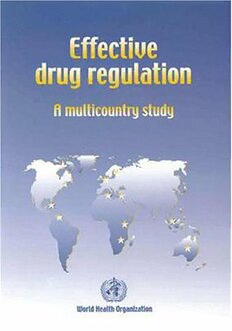
Effective Drug Regulation: A Multicountry Study PDF
149 Pages·2002·0.482 MB·English
Most books are stored in the elastic cloud where traffic is expensive. For this reason, we have a limit on daily download.
Preview Effective Drug Regulation: A Multicountry Study
Description:
Drugs play a crucial role in saving lives, restoring health, and preventing diseases and epidemics. But they need to be safe, efficacious, of good quality, and used rationally. This means that their production, import/export, storage, supply and distribution should be subject to government control through prescribed norms and standards and an effective regulatory system. Substandard and counterfeit drugs proliferate primarily in an environment where drug regulation has proved ineffective.This publication presents a synthesis of studies on drug regulation carried out in 10 countries: Australia, Cuba, Cyprus, Estonia, Malaysia, the Netherlands, Tunisia, Uganda, Venezuela, and Zimbabwe in 1998-1999. It gives an overview of the development of drug regulation in these countries as well as the resources available and the strategies applied in drug regulation implementation at the time the studies were conducted. An analysis of the strengths and weaknesses in drug regulation in these countries is also provided.
See more
The list of books you might like
Most books are stored in the elastic cloud where traffic is expensive. For this reason, we have a limit on daily download.
